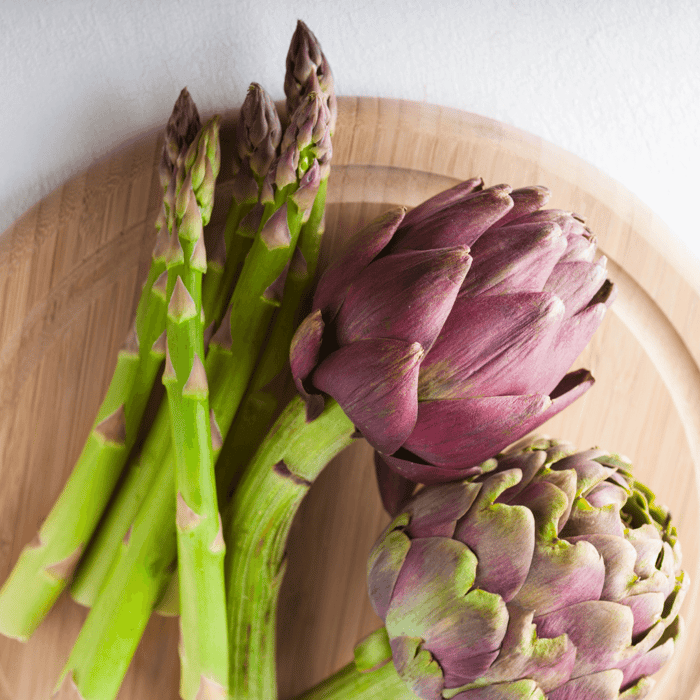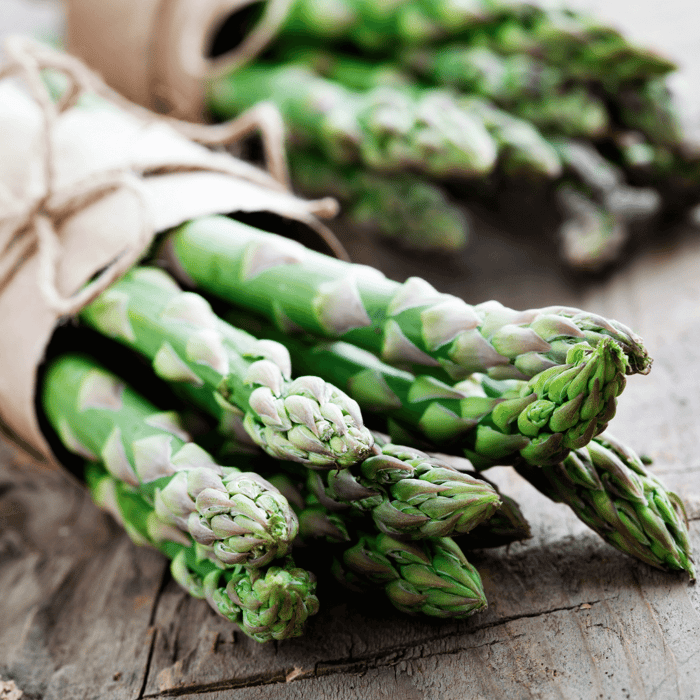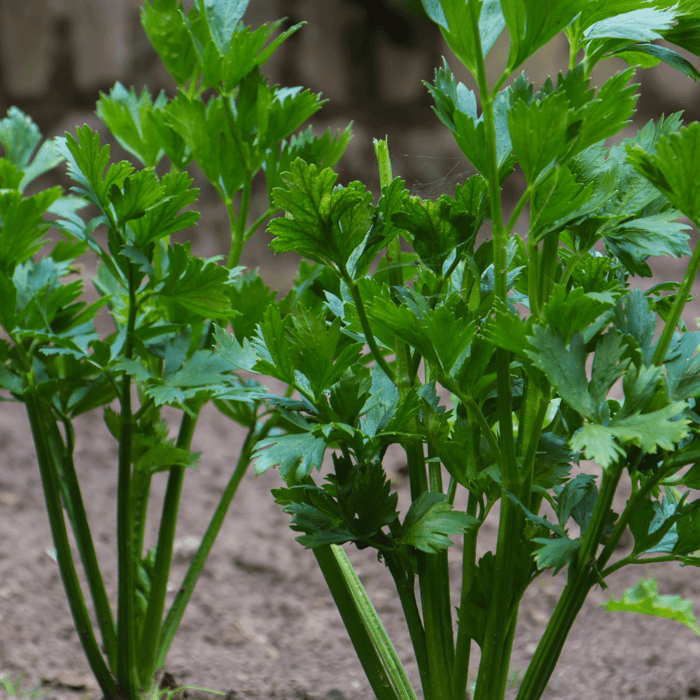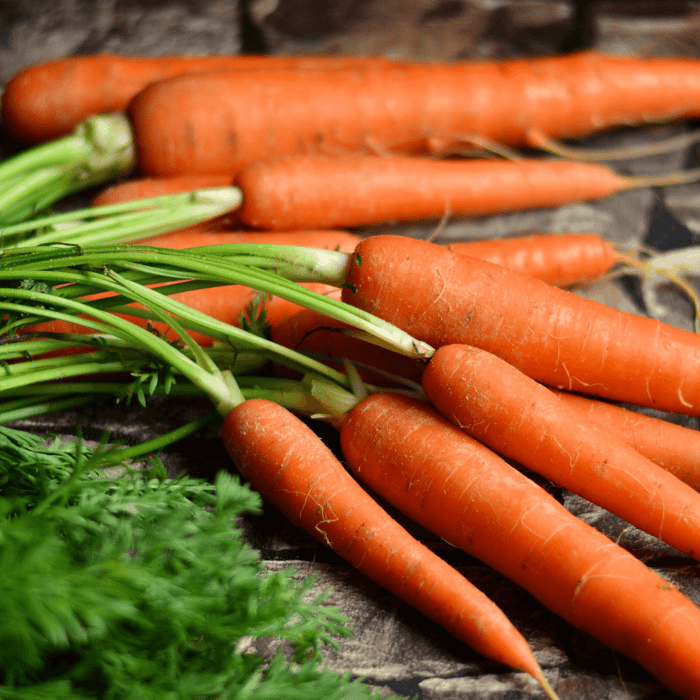As gardeners, we are always looking for ways to make our time and effort more efficient and productive. Have you ever wondered are any vegetables perennials? One way to do this is by incorporating perennial vegetables into our gardens.
Perennial vegetables are those that come back year after year, without the need for replanting. Not all vegetables are perennials, but knowing which ones are can have significant benefits for both the gardener and the environment. It can save you time and also it's fun to know that you can have vegetables come back each year with very little work.
Definition of Perennials
Perennial plants are those that live for more than two years. They have a root system that remains alive during winter dormancy, allowing them to return each spring with new growth. In the case of perennial vegetables, this means they will continue to produce edible parts year after year without needing to be replanted.
It is worth noting that not all parts of a plant may be perennial – for example, some plants may produce perennial roots but annual shoots or leaves. Therefore, it is important to understand which parts of a vegetable plant can be considered perennial before deciding whether or not to include it in your garden.
Why It's Important to Know Which Vegetables Are Perennials
Knowing which vegetables are perennials can benefit both the gardener and the environment in several ways. For example:
Economic benefits: By including perennial vegetables in your garden, you can reduce the cost of buying new seeds or starter plants every year as well as reduce labor costs associated with replanting.
Sustainability: Growing perennial crops instead of annual crops reduces soil erosion, preserves soil structure and fertility, and promotes biodiversity in soil organisms.
Nutrition: Many perennials contain more vitamins and minerals than their annual counterparts because they have had more time to develop deep root systems that can access more nutrients.
Environment: Perennial vegetables require less energy to grow since they don't need to be replanted each year. This means they also produce fewer carbon emissions, making them a more sustainable choice. In the next sections, we will explore some of the most common and lesser-known perennial vegetables to help you decide which ones might be best suited for your garden.
Common Perennial Vegetables
Asparagus
Asparagus is a popular perennial vegetable that belongs to the lily family. It is grown for its young shoots, which are harvested in the spring before they mature into tall ferns. Asparagus can be grown from seeds if started indoors.
Asparagus plants can grow up to 5 feet tall and thrive in well-drained soil with full sun exposure. They also require consistent moisture and protection from wind.
One of the biggest nutritional benefits of asparagus is its high fiber content, which aids in digestion and reduces the risk of certain types of cancer. Asparagus also contains several vitamins and minerals, including vitamin K, vitamin C, and folate.
Additionally, it is low in calories and high in antioxidants. Asparagus can be prepared in a variety of ways, including grilling, roasting, or sautéing.
It pairs well with many different flavors and ingredients, such as lemon juice or Parmesan cheese. As an ingredient in dishes like quiches or pasta salads, asparagus adds a unique texture and flavor that can elevate any meal.
Mary Washington Asparagus Seeds

$2.49
Mary Washington Asparagus Seeds - Heirloom, Non-GMO, Non-Hybrid, Open-Pollinated Grow your garden with our premium Mary Washington Asparagus seeds, a time-tested heirloom variety loved for its tender, flavorful spears and reliable yields. Perfect for home gardeners, these non-GMO, non-hybrid, and… read more
Rhubarb
Rhubarb is another popular perennial vegetable that has been grown for centuries for both culinary and medicinal purposes. It has large leaves with long stalks that are harvested for cooking. Rhubarb thrives in cool climates with rich soil that drains well.
One of the main nutritional benefits of rhubarb is its high concentration of antioxidants like anthocyanins and proanthocyanidins. These compounds have shown promise in reducing inflammation throughout the body and may help prevent chronic diseases like heart disease or cancer.
In cooking, rhubarb's tart flavor pairs well with sweeteners like sugar or honey. It can be used to make jams or jellies or added to baked goods like muffins or pies for a unique twist on traditional recipes.
Overall, asparagus and rhubarb are two popular perennial vegetables that offer many nutritional benefits and culinary uses. They may require some extra care and attention in the garden, but their long-term growth and yield can make them a worthwhile addition to any vegetable patch.
Lesser-Known Perennial Vegetables
The world of perennial vegetables extends beyond the commonly known asparagus and rhubarb. In fact, there are a number of lesser-known vegetables that can be grown as perennials. From artichokes to water chestnuts, these perennials offer unique flavors, nutritional benefits, and growing challenges.
Artichokes: A Taste of the Mediterranean
Artichokes are a popular ingredient in Mediterranean cuisine. These thistle-like plants produce large flower buds that are harvested before they open. The edible portion is the base of each bud, which is typically boiled or steamed until tender.
To grow artichokes as perennials, it is important to select a variety that is well-suited for your climate. Artichokes prefer mild climates with moderate temperatures and plenty of sunlight.
They require well-draining soil and regular watering. In addition to their delicious flavor, artichokes offer several nutritional benefits.
They contain antioxidants, fiber, and vitamin C. Apart from boiling or steaming them till tender for eating with butter or mayonnaise sauce in most parts of the world where they're grown; Artichoke leaves are dried and then powdered for an herbal extract that helps treat irritable bowel syndrome (IBS), which lowers cholesterol levels in the body among other health benefits.
Green Globe Artichoke Seeds

$2.49
Green Globe Artichoke Seeds - Heirloom, Non-GMO, Non-Hybrid, Open-Pollinated - Grow Lush, Nutritious Artichokes in Your Garden Plant your way to a bountiful harvest with Green Globe Artichoke seeds, a top choice for gardeners seeking an elegant, delicious, and nutrient-rich… read more
Chinese Water Chestnuts: Not Your Typical Nut
Despite their name, Chinese water chestnuts are not actually nuts at all but a rather aquatic vegetable that grows underground in shallow marshes and ponds. These crunchy tubers have a slightly sweet taste and can be eaten raw or cooked. Growing Chinese water chestnuts as perennials require a bit more effort than some other vegetables due to their unique growing conditions.
They require a constant supply of water and thrive in warm temperatures. Chinese water chestnuts are also rich in nutrients.
They are a good source of fiber, potassium, and vitamin B6. Aside from being eaten raw or cooked; Chinese water chestnuts can be sliced into small pieces and mixed with other vegetables to make a crunchy stir-fry or used as a meat substitute for vegan dishes.
Leeks as Perennial Vegetables
Leeks (Allium ampeloprasum var. porrum) are typically grown as biennial plants, but they can also be cultivated as perennial vegetables in some cases. By allowing a few leeks to remain in the ground and develop a stronger root system, they can continue to grow and provide harvests over multiple years. Growing leeks is a great way to add flavor to your dishes for multiple years.
American Flag Leek Seeds

$2.49
Grow Flavorful American Flag Leeks: Heirloom, Non-GMO Seeds Get ready to grow your own fresh and flavorful American Flag Leeks with our premium heirloom, non-GMO, non-hybrid, and open-pollinated seeds. These traditional, hardy leeks are perfect for both home gardens… read more
The Versatility of Perennial Vegetables
Artichokes, leeks, and Chinese water chestnuts are just two examples of the many lesser-known perennial vegetables that can be grown in your garden. While they may require a bit more attention than traditional annual vegetables, they offer numerous benefits that make them well worth the effort. Try incorporating these unique perennials into your garden to add some variety to your diet!
Benefits of Growing Perennial Vegetables
Reduced Effort and Cost in Replanting Every Year
Growing perennial vegetables can save you time and money in the long run. Unlike annual vegetables, which need to be replanted each year, perennials come back year after year. This means you don't have to spend money on seeds or seedlings every season, nor do you have to put in as much time and effort tilling the soil or preparing new beds.
Instead, you can focus on maintaining your existing plants and harvesting the fruit of your labor. In addition to saving time and money, growing perennial vegetables also allows you to plan ahead.
Since perennials come back every year, you can better predict when they will be ready for harvesting and plan your meals accordingly. This means less food waste and more efficient use of your garden space.
Increased Sustainability and Environmental Impact
Growing perennial vegetables is a more sustainable and environmentally friendly option compared to annuals. Since perennials require less replanting, there is less disturbance to the soil ecosystem. This allows beneficial organisms like earthworms to thrive, which in turn improves soil health.
Moreover, since perennials come back every year without needing replanting, there is less need for fertilizers or pesticides that can harm the environment. By reducing the amount of chemicals used in gardening practices, we can help preserve our planet's natural resources.
Growing perennial vegetables helps reduce carbon emissions by decreasing transportation costs associated with buying produce from far-flung areas. By growing our own food locally – especially if it's organic – we're doing our part to reduce our carbon footprint.
Improved Soil Health
Perennial vegetables are known for their ability to improve soil health due to their deep roots that break up compacted soil layers while also providing a steady source of nutrients. As perennial vegetables grow year after year, their roots work to maintain soil structure and support a diverse ecosystem of microorganisms that help break down organic matter.
This leads to an overall healthier soil that is better suited for growing other crops. Healthier soil has better water retention, allowing plants to better withstand droughts.
It also improves the fertility of the soil, allowing for higher crop yields over time. In addition, perennial vegetables require less disturbance of the soil compared to annuals, which can lead to better water infiltration and reduced erosion.
Vegetable Seed Vault Kit | 35 Variety Pack

$29.95
$49.95
Ultimate Survival Seed Vault: 16,000+ Non-GMO Heirloom Vegetable Seeds for Emergency Preparedness Introducing the Seed Vault Kit, your all-in-one solution for emergency preparedness and sustainable gardening. This premium seed kit contains over 16,000 non-GMO, Heirloom, Non-Hybrid, and Open Pollinated seeds,… read more
Benefits Beyond Your Garden
Growing your own perennial vegetables not only benefits you and your garden but also extends beyond your property lines. By sharing the produce from your garden with neighbors or donating it to local food banks or shelters, you can help reduce food waste and improve access to healthy food options in your community.
Moreover, by growing perennial vegetables, you're supporting sustainable agriculture practices that can help build a more resilient food system. By reducing the dependence on conventional farming methods that rely on chemicals and large-scale production systems, we can create more sustainable communities that are better equipped to face future challenges such as climate change and resource depletion.
Challenges in Growing Perennial Vegetables
Longer Establishment Period
One of the main challenges in growing perennial vegetables is their longer establishment period. Unlike annual vegetables that grow and produce within a single season, perennial vegetables take more time to grow before they start producing.
For instance, asparagus takes 2-3 years to establish before its first harvest, while rhubarb can take up to four years. During this time, gardeners must provide the right growing conditions and maintain the plant's health and vigor.
To ensure successful establishment, gardeners should prepare well-drained soil with plenty of organic matter like compost or well-rotted manure. They should also mulch around the plants to retain moisture and keep weeds at bay.
Additionally, regular watering and fertilization are necessary for establishing perennial vegetable crops. Despite the long wait period for perennial vegetables to produce a bountiful harvest, once established, these plants require minimal maintenance compared to annuals.
Limited Variety Compared to Annual Vegetables
Another challenge of growing perennial vegetables is the limited variety compared to annual vegetables. While there are many different types of annual vegetables that can be grown in a given year, there are only a few types of perennials that are commonly grown for food. Asparagus and rhubarb are some of the most popular perennial vegetable crops due to their taste and ease of growing them.
This makes it challenging for gardeners who want more variety on their plates from their gardens. Despite this limitation on variety, there is still an opportunity for growers who want diverse food sources from their gardens by supplementing with other perennials like fruits or nuts.
Location
I don't know about you, but I always think I choose a good location for plants and then later decide that I would like them somewhere else. This becomes difficult with perennial plants because moving them can become quite a challenge!
The Pros Outweigh The Cons
While there are challenges in growing perennial vegetables, the benefits outweigh the cons. They provide a sustainable source of food with minimal replanting and reduced impact on the environment.
Also, once established, they require less maintenance due to their developed root system and hardiness. Moreover, they improve soil health by adding organic matter through their long lifespan while reducing soil erosion caused by annual tilling.
While growing perennial vegetables may seem daunting due to their longer establishment period and limited variety compared to annuals, it provides a unique opportunity for gardeners to create a sustainable food source while improving soil health. Gardening with perennials has its rewards in saving time and money and providing for our health and well-being.
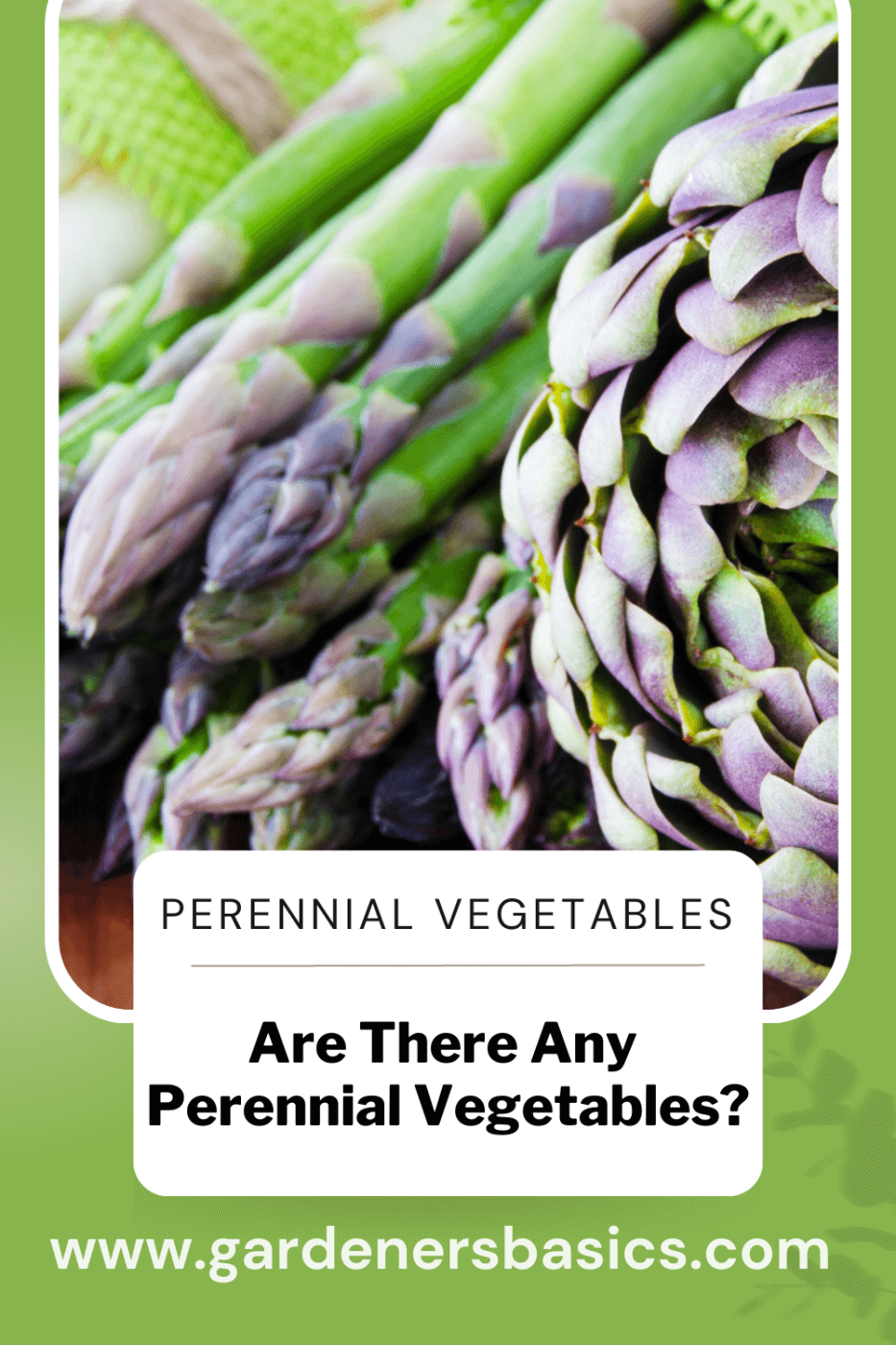 FAQ: Are Any Vegetables Perennials?
FAQ: Are Any Vegetables Perennials?
-
What are perennial vegetables?
Perennial vegetables are plants that can live for multiple years, producing vegetables continuously or seasonally, without the need for replanting each year. They typically have a more extensive root system compared to annuals, allowing them to survive harsh weather conditions and regrow in the following growing season.
-
What are some examples of perennial vegetables?
Some common perennial vegetables include asparagus, artichoke, rhubarb, sorrel, sea kale, and perennial onions. There are also lesser-known perennial vegetables, such as Good King Henry, skirret, lovage, and Turkish rocket.
-
What are the benefits of growing perennial vegetables?
Growing perennial vegetables has several advantages, including reduced soil erosion, improved soil structure, lower maintenance, and less frequent replanting. Additionally, many perennial vegetables have deep root systems, making them more drought-resistant and efficient at nutrient uptake.
-
Can perennial vegetables be grown in any climate?
Perennial vegetables can be grown in a wide range of climates, but the specific varieties suitable for your area may differ. It is essential to research the best perennial vegetables for your climate and growing conditions and to choose plants adapted to your specific region.
-
Are perennial vegetables more nutritious than annual vegetables?
Perennial vegetables can be just as nutritious, if not more so, than their annual counterparts. They often have higher levels of vitamins, minerals, and antioxidants due to their extended growth period and deep root systems that allow them to access a wider range of nutrients.
-
How do I care for perennial vegetables?
Perennial vegetables generally require less maintenance than annual vegetables. However, they still need regular watering, fertilizing, and pruning to keep them healthy and productive. It is also essential to ensure proper spacing between plants to avoid overcrowding and facilitate air circulation.
-
Can perennial vegetables be grown in containers?
Yes, many perennial vegetables can be grown in containers. However, it is crucial to choose a large enough container to accommodate the plant's root system and to provide proper drainage and nutrient-rich soil. Regular watering and fertilization will also be necessary to maintain a healthy container-grown perennial vegetable.
-
How do I propagate perennial vegetables?
Perennial vegetables can be propagated through various methods, such as division, root cuttings, stem cuttings, and seeds. The appropriate propagation method will depend on the specific vegetable species. Be sure to research the best method for the perennial vegetables you are growing.
-
Can I grow perennial vegetables alongside annual vegetables?
Yes, perennial vegetables can be grown alongside annual vegetables in a mixed garden. However, it is important to plan your garden layout carefully, taking into account the different growth habits, space requirements, and sunlight needs of both types of plants.
-
Are there any disadvantages to growing perennial vegetables?
While perennial vegetables offer many benefits, there are some potential drawbacks, including slower initial growth and a longer wait for the first harvest compared to annual vegetables. Additionally, some perennial vegetables may require more space to grow, and certain species may be susceptible to pests and diseases.
Seed Safe Survival Seed Kit - 35 Variety Pack

$29.95
$49.95
Seed Safe Survival Seed Kit: The Ultimate Heirloom Collection for Self-Sufficient Gardening Introducing the Seed Safe - 35 Varieties of Heirloom Vegetable, Herb, and Fruit Seeds, the ultimate solution for gardeners who want to secure a bountiful future harvest. This… read more
Conclusion Are Any Vegetables Perennials
Recap on the Importance of Knowing Which Vegetables are Perennials
Overall, growing perennial vegetables provides many benefits beyond just having fresh produce available in your backyard. From reducing costs and effort associated with replanting every season to improving soil health and supporting sustainable agriculture practices – there are many reasons why you should consider adding perennials to your garden plan. With some thoughtful planning and care, you'll be able to enjoy the fruits (and veggies) of your labor year after year.
Knowing which vegetables are perennials can help to improve the sustainability and environmental impact of our gardens. By growing vegetables that come back year after year, we can reduce the effort and cost of replanting every season while also improving soil health. In addition, growing perennial vegetables can provide us with a more diverse range of food options, such as asparagus, rhubarb, leeks, artichokes, and Chinese water chestnuts.
Perennial vegetables also offer a unique opportunity to connect with the natural world and learn about agricultural practices from different cultures. They often require less intensive care and attention than annuals and can be grown alongside other perennials or ornamentals in garden beds or containers.
Encouragement to Try Growing Perennial Vegetables in Your Own Garden
If you’re new to gardening or have never grown perennial vegetables before, don’t be intimidated. Starting small with just one or two plants is a great way to get started. Asparagus is an excellent choice for beginners as it’s relatively easy to grow and requires minimal maintenance once established.
When selecting perennial vegetable varieties for your garden, consider your climate zone, soil type, and available sunlight. Some plants may not thrive in certain conditions but there are many adaptable species that can grow well in a variety of settings.
By incorporating perennial vegetables into your garden design, you’ll be contributing to the health of local ecosystems while enjoying a variety of delicious fresh produce throughout the growing season. Now that you know the answer to are any vegetables perennials, do you think you'll add some perennial vegetables to your garden? With some patience and care, these crops will continue to yield harvests year after year – providing nutritious meals for you and your loved ones for seasons to come!




 FAQ: Are Any Vegetables Perennials?
FAQ: Are Any Vegetables Perennials?



